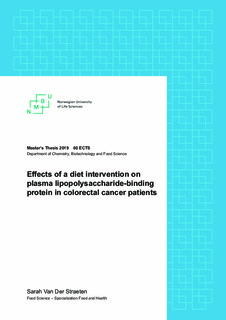| dc.contributor.advisor | Carlsen, Harald | |
| dc.contributor.advisor | Bøhn, Siv Kjølsrud | |
| dc.contributor.advisor | Kværner, Ane Sørlie | |
| dc.contributor.author | Van der Straeten, Sarah | |
| dc.coverage.spatial | Norway | nb_NO |
| dc.date.accessioned | 2019-10-09T14:05:24Z | |
| dc.date.available | 2019-10-09T14:05:24Z | |
| dc.date.issued | 2019 | |
| dc.identifier.uri | http://hdl.handle.net/11250/2621278 | |
| dc.description.abstract | Objective: Increased systemic level of lipopolysaccharide-binding protein (LBP) is proposed to be a biomarker of increased gut permeability. The main objective of this master thesis was to investigate whether a one year dietary intervention would affect the plasma LBP levels in colorectal cancer (CRC) patients and investigate if the intervention had the desirable effects on intake of food groups such as fiber-rich foods and red- and processed meat. Secondary objective was to investigate the associations between LBP and dietary- and clinical factors.
Subjects and method: CRC patients (n=219), aged 50-80 years old, were randomized into an intervention group or a control group. The intervention group received a one year intensive dietary intervention based on the Norwegian food-based dietary guidelines. Both groups received advice regarding physical activity. Dietary intake and physical activity were assessed by a short food-frequency questionnaire. Clinical data and symptoms were registered at the study center at baseline, after 6 months and 1 year or collected from hospital records. Plasma LBP was measured by ELISA.
Results: There was no significant difference between the groups with regards to change in plasma LBP concentrations after a one year dietary intervention despite the significant impact on intake of fiber-rich foods and reduction in red meat intake. The intake of the majority of the selected food groups did not correlate with LBP. Significant higher LBP concentrations were found at baseline for individuals that had experienced cerebral hemorrhage (stroke) (p=0.048) and a trend for individuals with pain and fatigue, while lower LBP was associated with osteoporosis (p=0.027) and diarrhea (p=0.021). At 12 months higher LBP was associated with kidney disease (p=0.036) and fatigue (p=0.018) and a trend was found for BMI, diabetes (type 1 and type 2) and heart failure. In addition, a weak positive correlation between LBP and time since surgery was found. Lower LBP concentrations were associated with higher TNM-status (p=0.017), osteoporosis (p=0.007) and a trend for neoadjuvant treatment. No significant association between physical activity and LBP was found.
Conclusion: These results indicate that a dietary intervention over 12 months did not alter plasma LBP concentrations despite significant changes in dietary intakes. The associations between LBP and clinical factors such as diseases and symptoms suggest that LBP may be a relevant biomarker of health outcomes. Future investigations are however needed to evaluate the role of LBP as a gut integrity biomarker and the impact of the gut microbiota on this relationship. | nb_NO |
| dc.language.iso | eng | nb_NO |
| dc.publisher | Norwegian University of Life Sciences, Ås | nb_NO |
| dc.rights | Attribution-NonCommercial-NoDerivatives 4.0 Internasjonal | * |
| dc.rights.uri | http://creativecommons.org/licenses/by-nc-nd/4.0/deed.no | * |
| dc.subject | Lipopolysaccharide | nb_NO |
| dc.subject | LPS | nb_NO |
| dc.subject | LBP | nb_NO |
| dc.subject | Diet | nb_NO |
| dc.title | Effects of a diet intervention on plasma lipopolysaccharide-binding protein in colorectal cancer patients | nb_NO |
| dc.type | Master thesis | nb_NO |
| dc.description.version | submittedVersion | nb_NO |
| dc.subject.nsi | VDP::Matematikk og Naturvitenskap: 400::Basale biofag: 470::Generell immunologi: 478 | nb_NO |
| dc.subject.nsi | VDP::Matematikk og Naturvitenskap: 400::Basale biofag: 470::Molekylærbiologi: 473 | nb_NO |
| dc.source.pagenumber | 132 | nb_NO |
| dc.description.localcode | M-MAT | nb_NO |

